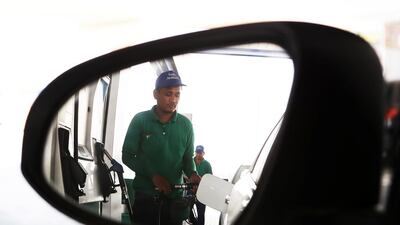The first transport fuel prices announced under the Government’s new free market regime were greeted warily by UAE businesses, as petrol pump prices were hiked by 24 per cent while diesel was cut by 29 per cent.
The Ministry of Energy’s new fuel price-setting committee yesterday said that all UAE petrol stations would from August 1 drop diesel prices from Dh2.90 a litre, to Dh2.05 a litre, while petrol prices (95 Octane) would increase from Dhs 1.72 a litre to Dhs 2.14 a litre.
Suhail Al Mazrouei, the Minister of Energy, said the objective of the new regime was to have the lowest free market fuel prices for consumers, although regional fuel prices that remain subsidised – Saudi Arabia’s, for example – would still be much lower than those in this country.
That situation was anticipated by the Government, which recently put restrictions on vehicles filling up in Saudi Arabia and crossing into the UAE.
“You will see [prices] lower than any liberated market because there is no tax and we reduced the profitability of the companies downward,” said Mr Al Mazrouei.
“For businesses, we think the impact on diesel is going to be positive. The reduction … should drive [down] the operating and transportation costs for many sectors. Already, we saw a reduction in [some public transport] tariffs.”
He said the aim is for transparent and predictable prices in future by setting the price each month based on international benchmark prices plus a “small profit, which will not change”, for the local distribution companies, including Abu Dhabi National Oil Company (Adnoc) and Emirates National Oil Company (Enoc).
Cutting diesel prices initially was painful for the distribution companies, as the Adnoc Distribution chief executive, Abdulla Al Dhaheri, made clear.
“Given the prevailing global prices, it was a real challenge for Adnoc Distribution to cut down diesel prices,” Mr Dhaheri said. “The decision to reduce diesel prices has been taken in the public interest with the aim of supporting the national economy and ensuring its global competitiveness.”
But some say it is not yet clear that the overall effect of the fuel price change will be lower costs, even for some of the largest diesel users.
“I think it is too early to know how it will affect the total logistics market,” said Mohamad Alkhas, the chief executive for GCC countries for Aramex, one of the biggest parcel delivery outfits in the UAE.
Aramex runs about 100 lorries, 300 cars and 300 motorbikes in its UAE fleet, but they are a mixture of petrol and diesel-based.
“And the impact for the cross-border fleet will be much higher and harder to predict,” Mr Alkhas added.
Indeed, many companies operating on a large scale regionally try to optimise their fuel costs by filling up where possible in the lowest-price subsidised countries. Companies in the UAE may try to source petrol in Saudi Arabia, where the fuel is about US$0.15 a litre, versus $0.46 a litre in this country before the August increase.
Moon Star Freight in Dubai uses about 90 sub-contracted drivers, many of whom have already been hit by the change in rules restricting their ability to fill up in Saudi Arabia, according Clinton John, a senior marketing executive with the company.
“We will have to see two or three months of price changes to gauge what the impact will be,” Mr John said. “Prices of diesel could go back up so we don’t know that we would make any decisions about our fleet until we see how it is going to go over time.”
A lot of companies such as Moon Star Freight are too small to consider hedging prices.
The overall impact on many non-transport companies is not likely to be significant initially.
“Gasoline and diesel are important inputs for our transport operations, but any variations which may occur as a result of the new gasoline and diesel deregulation law by the UAE Government would not likely have a significant impact on production costs,” said Abdallah Massaad, the chief executive of RAK Ceramics. Last year, he said, RAK Ceramics spent Dh24.7 million on petrol and diesel, which is less than 2 per cent of revenues.
Consumer prices will immediately be affected by the petrol price rise but more gradually from diesel prices, if businesses choose to pass on the reductions.The combined fuel price changes should add about 1.3 percentage points to headline consumer price inflation, according to Monica Malik, an economist at Abu Dhabi Commercial Bank. The year-on- year inflation rate to June for the UAE was 4.2 per cent.
amcauley@thenational.ae
Additional reporting by LeAnne Graves and Adam Bouyamourn
Follow The National's Business section on Twitter

